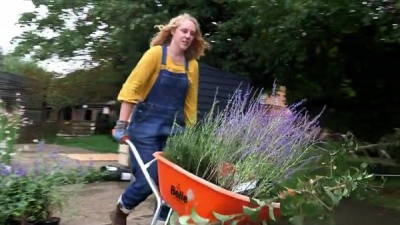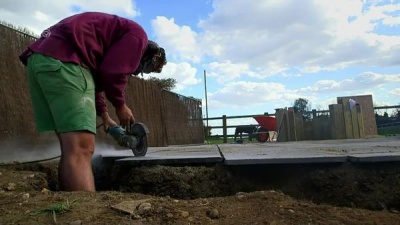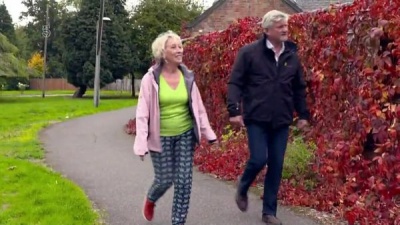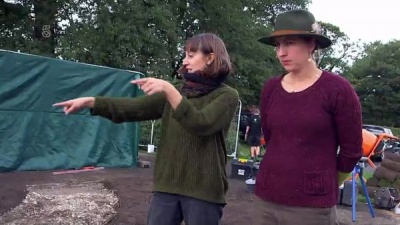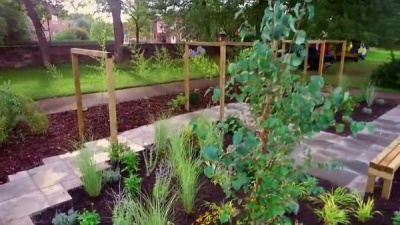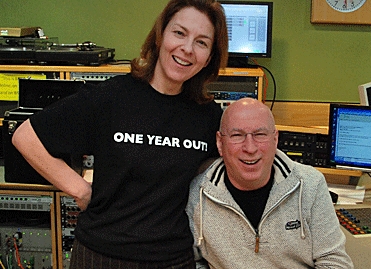Weaver's Week 2019-08-04
Last week | Weaver's Week Index | Next week
Anyone for a mud pack?
Contents |
The Great Garden Challenge (2)
Crackit Productions for Channel 5, 2 July – 6 August
The production team wanted to remind us of Bake Off; we got hints of Scrapheap Challenge and a scent of Challenge Anneka.
The challenge is top-drawer Public Service Broadcasting: give something to the community, and make a programme about it. The challenge is to design and build a garden for a deserving cause, such as a care home or a children's centre. Unlike Anneka Rice's Challenge programme, the contest doesn't include anyone persuading other people to help.{1}
There's a lot of value being added for our entertainment. The producers spend £10k per episode on building and garden supplies, they've taken two weeks work from eight quality garden brains, and paid for a bunch of local labour. The result is gardens for good causes at no cost to them, and with the design and installation work done on someone else's dime.
The focus has to be the entertainment value, and we found there was something missing. The Great Garden Challenge runs for a full 75 minutes, including its commercials. That's a long running time, and they don't quite have enough content to fill the programme. We reckon they could easily lose a full segment, and fit the programme into a commercial hour. Outside of the semi-final episode (which was effectively two separate competitions in one show) there's simply not enough garden building to fill the space available.
So there are lots of shots of people making gardens. People planting railway sleepers and scaffolding boards, digging holes for trees and manhandling the inevitable shed. They spend a lot of time on the physical construction of the garden, and relatively little on the plants. This is a fair representation of the time, but really doesn't make for better television. Just for variety, we want to know why have these plants been chosen, what they're like in this soil.
The format is like Scrapheap Challenge from the early years of the century, a mammoth effort involving a manageable crew of people, with presenters butting in to ask what's going on. But we don't get the denouement, we don't see the machine fly apart in a fusillade of sparks and flame and rubber bands. Instead, we get a semi-formal garden and a pair of judges going round with clipboards and monocles.{2}
The producers wanted their show to be like Bake Off, and there are resemblances. Garden Challenge is a process show, it's relatively slow-paced, and the judges bring personality to the show. But Bake Off has ups and downs, three little climaxes to each show, as we judge bakes in different ways. Garden Challenge only ever ramps up the tension towards its one judging climax, and we miss the light and shade.
Diarmuid Gavin and Nicki Chapman are the hosts. They'll mill about the gardens, asking questions to jolly along the plot. Nicki will spend a little time with the clients, the people who use or live in the place where they're working, pluck our heartstrings a little more. But mostly they're buzzing around, keeping the show puttering along. The arrival of the judges, midway through part four, introduces some fresh faces into what's becoming a stale drama.
The judges are gardening expert Carol Klein, and landscaper and designer Mark Gregory. Wisley's curator Matthew Pottage is promised as a guest judge for next week's final. We trust the judges, they set out their stall with "industry criteria", which strike us as fair and reasonable. They provide evidence for their judgements, and refer to criteria we can see on screen.
We were a little hacked off in one episode, where the judges spoke for the centre's clients, saying "ooh, this might not be good in a wheelchair." There's a very good way to test this: have someone in a wheelchair go over that bit of path, and ask that person their opinion. But no, the judges know best, even when they come across as patronising.
Something missing from the judge's criteria: how long will this garden last? The gardens appear to be show gardens, built for the moment, evanescent, transient, very short-lived. The judging is immediately after construction, and we get to see a brief clip of people enjoying the garden "two weeks later". There's no mention of how sustainable these gardens are, how much work and maintenance they'll need over the weeks and years ahead – or if this is a criterion the centre can set for their designers to consider. The show's publicity waxed long about "lasting green legacies"; we didn't see any evidence of that in the programme.
Also missing: information we can use in our own gardens. The episodes we saw were full of advice on how to cut up railway sleepers, and when to plant £1000 trees, but this isn't going to help in a suburban back garden the size of a postage stamp.
Ultimately, we are being harsh on Great Garden Challenge. The show does a lot of good things for the community, and it's entirely watchable television. This column expected a little bit more, perhaps we believed the press release saying it's the new Bake Off. It's not, and the comparison does it few favours. It's a good show, but we expected a great show, and we're left a little deflated.
Footnotes
{1} Even though it would be useful to know the soil type, we don't hear that info. Nor is there a discussion of the rocks on which Dorking stands.Back
{2} We've made up the monocles, or at least we don't see them on screen.Back
Take good due care of my baby contestant
OFCOM has proposed new rules about protecting participants to television. The proposed rules are:
- A) Due care must be taken over the welfare, wellbeing, and dignity of participants in programmes.
- B) Participants must not be caused unjustified distress or anxiety by taking part in programmes or by the broadcast of those programmes.
As is OFCOM's way, these are not prescriptive rules. There isn't a single set amount of care that's deemed to be right, and a moment's thought will explain why. The amount of care due to a participant on Love Island – locked away from friends and family, seen by millions of people every night for months – will be large. The care due to a workman on The Great Garden Challenge – pre-recorded, on the background of the screen for perhaps a minute in one show – will be much less, but not nil. Producers will have to use their skill and judgement to get it right.
Some have argued that OFCOM might be stepping beyond its legal boundaries, by regulating what goes on behind the scenes. This column doesn't agree: OFCOM was established with a broad and somewhat nebulous remit from parliament, and effectively chooses what to regulate. It has (now, belatedly) chosen to regulate the care of participants.
OFCOM has said that there is public demand for this change to the rules, citing over 25,000 complaints about an assault claim on Celebrity Big Brother last year, and further thousands from Love Island and Loose Women. This column has noted on many occasions that there were spikes in complaints about constructed reality shows, and suggested that there was public demand for *something* to be done, without articulating *what* should be done. Only now has OFCOM chosen to act; only now has OFCOM been able to translate the public's unease into something concrete.
OFCOM has specifically asked producers to send in examples of best practice, and we sense that the rule will initially be interpreted in the light of best practice. The regulator's guidance might suggest what programme-makers should do to look after participants before, during, and after production. It would also consider editorial techniques involving participants, such as the use of polygraphs.
As always seems to be the way, OFCOM is only acting after bad events have happened: in this case, the death of a contributor to The Jeremy Kyle Show, and subsequent cancellation of that programme. The contributor was upset by how the show handled the results of a polygraph experiment. Commonly known as a "lie detector test", the polygraph purports to measure a respondent's truth by physical responses. It is as accurate as measuring the weather by sticking your head in a cardboard box.
The proposed rules will apply to all contributors to television and radio, except paid staff and actors in drama. For consistency, there are also tweaks to rules specifically protecting children on television. Viewer comments are sought until 23 September.
This Week and Next
Congratulations to the students of Aberdeen University, who beat the dons on The 3rd Degree. Students average about one win a year over their lecturers.
Congrats also to Amber and Greg, who won the televote at the end of Love Island.
The death has occurred of Marcel Berlins, lawyer and journalist, and regular on Round Britain Quiz. He was 77.
ITV Studios has bought out entertainment creators Armoza Formats. The company, founded by Avi Armoza, has made shows including The Bubble (BBC2, 2010), The Common Denominator (C4, 2013), and Babushka (ITV, 2017). We cannot recall an Armoza format that's been renewed in this territory.
Nevertheless, Armoza has hit programmes overseas. "The Four" is a series of one-on-one singing or dancing battles. "Still Standing" is a trivia quiz where wrong answers drop players through the floor, and "I Can Do That!" encourages stars to do stunts. Armoza will continue to operate out of Tel Aviv.
The Strictly Klaxon has been firing early this year, alerting us to another celebrity who has signed up for television's top dancing programme. Who are these people? What are their prospects? Who are their agents? So far, we have
- Chris Ramsey, 33, a comedian from South Shields. You'll know him from The Chris Ramsey Show on Comedy Central. Chris is represented by Avalon Management.
- David James, 49, a goalkeeper from Welwyn Garden City. You'll know him from time at Liverpool and Portsmouth. We are unsure who represents David.
- Emma Barton, 42, an actor from Portsmouth. You'll know her as Honey in The Eastenders. Emma is represented by InterActors.
- Saffron Barker, 19, a social media expert from Brighton. You'll know her... actually, you won't. Ask a ten-year-old. Saffron is represented by M&C Saatchi.
- Catherine Tyldesley, 35, an actor from Manchester. You'll know her as Eva Price in Coronation Street. Catherine is represented by United Agents.
- Mike Bushell, 54, a television host from Salford. You'll know him from representing Winchester on It's a Knockout in 1982, where he fell into the pool. Mike is represented by Knight Ayton.
- Karim Zeroual, 19, an actor and presenter from London. You'll know him from all the links on CBBC. We're unsure who represents Karim.
More hoofers and doofers next week.
BARB ratings in the week to 21 July.
- Coronation Street remains television's top show (ITV, Wed, 6.75m). After Emmerdale Farm comes Love Island (ITV2, Mon, 6m), the top game of the week.
- ITV holds down the next three positions: The Chase (Fri, 3.3m), The Voice Kids (Sat, 3.15m), and Tipping Point Lucky Stars (Sun, 2.85m). BBC1's biggest game was Pointless Celebrities (Sat, 2.8m).
- Love Island Aftersun (ITV2, Sun, 2.4m) proved more popular than A Question of Sport (BBC1, Fri, 2.35m), but University Challenge (BBC2, Mon, 2.1m) easily beat Love Island Unseen Bits (ITV2, Sat, 1.95m).
- The Great Garden Challenge continues to score well (C5, Tue, 1.065m). A good score for The Crystal Maze (C4, Fri, 1.025m), up 20% on last week by containing 20% less bigot.
Radio ratings figures were out this week, and we see that Popmaster is not just the biggest feature on Radio 2, but the most popular feature on any station. Over 3 million people listen to the average day's quiz, comfortably ahead of John Humphrys Sympathises With Racists (Radio 4, 8.15am, 2.55m) and Greg James' Daily Quiz of the Day (Radio 1, 7.15am, 1.9m). Figures from RAJAR/Ipsos Mori/RSMB for the quarter ending 23 June.
Channel 4 rolls back the years to remember Jade (Wed); this column's obituary may be interesting. There are new series of Mastermind (BBC2, Fri) and Just a Minute (R4, Mon). BBC New Comedy Award moves to the semi-finals (Radio 4 Extra, Wed and Thu), and it's the final of The Great Garden Challenge (2) (C5, Tue).
Photo credits: Crackit Productions.
To have Weaver's Week emailed to you on publication day, receive our exclusive TV roundup of the game shows in the week ahead, and chat to other ukgameshows.com readers, sign up to our Yahoo! Group.


